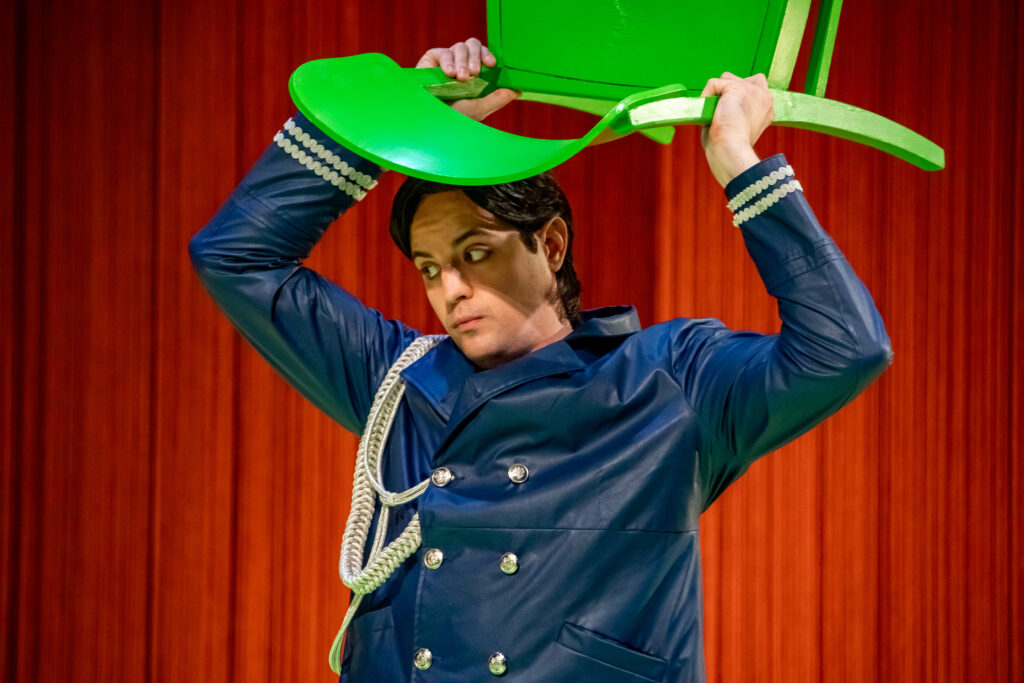FERRANDO
The rol of Ferrando from «Così fan tutte», composed by Wolfang Amadeus Mozart, was performed at Wilhelma Theater in 2024

ROLE INFORMATION
NAME: Ferrando
AGE: Young man
PROFESSION/STUDIES: Soldier and noble
FAMILY: Unknown
FRIENDS: Guglielmo and Don Alfonso
LOVE: Dorabella…or was Fiordiligi?
PHYSICAL DESCRIPTION: a young soldier of great attractiveness and great bearing. He is dressed in a Spanish uniform from the 80’s
PSYCHOLOGICAL DESCRIPTION: innocent young man who believes in the value of love and friendship. Empathetic to the emotions of others. A bit gullible and simple. Guilty for being attracted to a woman who is not his own
HOBBIES: gambling, drinking, contemplative life, laughing with friends, etc
FAVORS: A calm, affable and unambitious person. He believes in pure love and destiny
DEFECTS: Fairly innocent
PERSONAL ITEMS: soldier’s coat, aviator glasses
WHAT IF
What would happen if the traditional atmosphere of “Così fan tutte” took place in the era of the “Movida Madrileña”?
What if the aesthetics were the 80’s in Spain?
What would a “Così fan tutte” inspired by Almodovar’s films be like?
A comedy of entanglements set in the era of the “uncensored” and the Spanish “uncontrolled”. Sounds like a guaranteed laugh
Ferrando and Guglielmo are two young Spanish soldiers who bet with their old friend Don Alfonso (a priest) that their wives (Dorabella and Fiordiligi) are the most faithful of all. Don Alfonso, a person of great experience, sets a trap for them with the help of the cunning Despina (the women’s servant) and the two young men learn a valuable lesson: never bet against a priest…
SYNOPSIS
«Così fan tutte «
Overview of the Role
Ferrando is one of the male leads in Wolfgang Amadeus Mozart’s opera Così fan tutte (1790). He is a young soldier and the romantic partner of Dorabella, but he gets caught in a comedic and emotional test of love and fidelity.
- Voice Type: Lyric Tenor
- Character Type: Romantic, passionate, slightly naïve, but emotionally complex
- Role in the Story: One of two disguised lovers in a cruel test of fidelity
Role in the Plot
Ferrando is one of two soldiers (along with his friend Guglielmo) who get caught in a bet with the cynical philosopher Don Alfonso. The bet? That their fiancées (Dorabella and Fiordiligi) will remain faithful, even when tempted.
Act I: The Bet & Disguise
- Ferrando and Guglielmo swear that their lovers are faithful. Don Alfonso laughs and bets that all women are fickle («così fan tutte» = «all women are like that»).
- They pretend to go off to war, only to return in disguise as exotic Albanians.
- Each soldier flirts with the other’s fiancée, trying to seduce them while hiding their true identity.
- Ferrando courts Fiordiligi (his best friend’s girlfriend), but she resists him at first.
Act II: Emotional Turmoil
- Dorabella quickly falls for Guglielmo, but Fiordiligi stays faithful to Ferrando.
- Ferrando becomes deeply emotional, realizing that Fiordiligi might actually be the most loyal of the women.
- However, Fiordiligi finally gives in, breaking Guglielmo’s heart.
- In the end, everything is revealed, and the couples reconcile in a bittersweet conclusion.
Ferrando’s Musical Highlights
Ferrando’s music is some of the most beautiful tenor writing in all of Mozart’s operas, showcasing tenderness, passion, and despair.
Arias & Key Moments
1. «Un’aura amorosa» (Act I – Love & Hope)
- Ferrando’s first big aria, expressing deep love for Dorabella.
- A lyrical, floating melody, requiring excellent legato and breath control.
- One of Mozart’s most famous tenor arias!
2. «Ah, lo veggio, quell’anima bella» (Act II – Passion & Confusion)
- Ferrando becomes more passionate and dramatic, seeing Fiordiligi’s emotional struggle.
- More energetic and fiery than his first aria, with challenging coloratura passages.
3. Duets & Ensembles
- Duet with Guglielmo («La mia Dorabella») – A playful, confident moment where the two friends boast about their lovers’ fidelity.
- Quartet («Il core vi dono») – A crucial moment when Dorabella gives in to Guglielmo, while Ferrando watches in shock.
- Finale («Tutti accusan le donne») – A humorous but slightly bittersweet reconciliation.
Vocal & Dramatic Interpretation
Ferrando requires a lyric tenor with:
- Smooth, elegant phrasing (for «Un’aura amorosa»).
- Dramatic intensity (for the Act II arias).
- Great ensemble skills (Mozart’s music often blends multiple voices).
- Strong acting ability – transitioning from playful confidence to heartbreak.
Character Development
- Act I: Confident, playful, deeply in love. Ferrando is certain of Dorabella’s loyalty.
- Act II: Shattered & emotional – He starts to feel the pain of betrayal.
- End of the Opera: Forgiving but changed – He laughs off the deception, but there’s a hint of sadness in his acceptance.
Historical & Contextual Significance
- Così fan tutte was one of Mozart’s last operas, written in 1790.
- Initially seen as a light comedy, but modern productions emphasize its psychological depth.
- Ferrando’s vocal writing is pure Mozartian elegance, balancing lyric beauty with dramatic weight.
Why is Ferrando Special?
A balance of comedy, romance, and emotional depth..
A dream role for tenors, with one of Mozart’s most famous love arias.
A complex character arc, moving from confidence to heartbreak.
Ensemble-heavy role, requiring strong chemistry with the other singers.